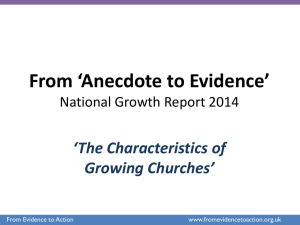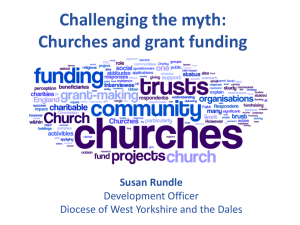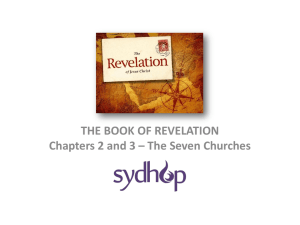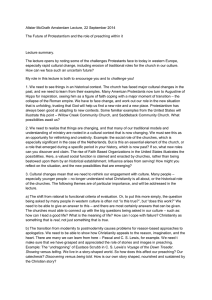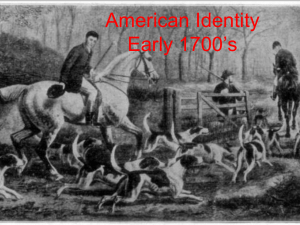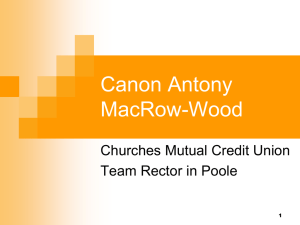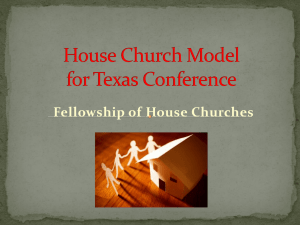Church growth and size - Church Growth Research Programme
advertisement
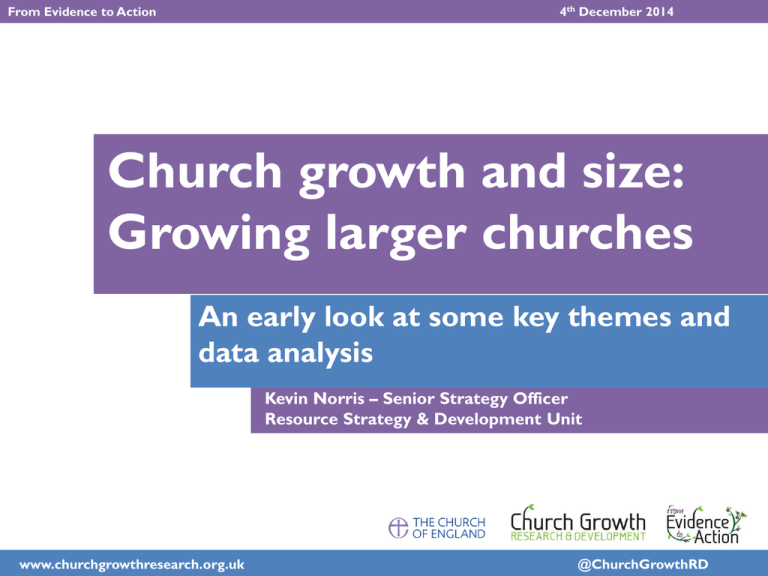
From Evidence to Action 4th December 2014 Church growth and size: Growing larger churches An early look at some key themes and data analysis Kevin Norris – Senior Strategy Officer Resource Strategy & Development Unit www.fromevidencetoaction.org.uk www.churchgrowthresearch.org.uk @ChurchGrowthRD @ChurchGrowthRD #EvidenceToAction From Evidence to Action 4th December 2014 Overview • What does the data about larger churches tell us? • Factors relating to growth for larger churches • Challenges faced by larger churches • An example: St Thomas Crookes, Sheffield www.churchgrowthresearch.org.uk @ChurchGrowthRD From Evidence to Action 4th December 2014 What did the research involved? • Defining and sampling: • Large church: 200+ attendance • Very large church: 500+ attendance • Focus where significant growth or decline • Data analysis • Interviews with leaders from 39 larger churches of different: • • • • size geographical location growth or decline records tradition www.churchgrowthresearch.org.uk @ChurchGrowthRD From Evidence to Action 4th December 2014 Some headline figures: Large Churches (200+): Very large Churches (500+): • 7.3% of parishes • 0.6% of parishes • 31.5% of the attendance of the Church of England • 6.5% of the attendance of the Church of England • Pay £5,000 more in parish share than they receive in ordained ministry provision • Pay £45,000 more in parish share than they receive in ordained ministry provision www.churchgrowthresearch.org.uk @ChurchGrowthRD From Evidence to Action 4th December 2014 Proportion of churches made up by larger churches? Region Area type Proportion of churches which are large (%) Proportion of churches which are large (%) Greater London 18 City centre 27 North West 12 Towns 18 South East 11 Suburbs 17 Yorkshire & Humber 5 South West 5 East of England 4 East Midlands 4 Council estates Commuter belt rural villages Rural villages www.churchgrowthresearch.org.uk 4 1 0.5 @ChurchGrowthRD From Evidence to Action 4th December 2014 Where are the 500+ churches? www.churchgrowthresearch.org.uk @ChurchGrowthRD From Evidence to Action 4th December 2014 Are they growing? – the case of churches that are now large • Grew by 4.6% in the last 5 years (compared to churches of all sizes which shrank by 3.9% • Churches now very large grew by 8.3% over the past 5 years ago. Much of the growth in the C of E comes from churches becoming large in a short space of time www.churchgrowthresearch.org.uk @ChurchGrowthRD From Evidence to Action 4th December 2014 However – this growth is fragile… • Churches that were large 5 years ago have declined by more than the national average: 7.9% • Very large churches that were large 5 years ago have declined by 9.2% www.churchgrowthresearch.org.uk @ChurchGrowthRD From Evidence to Action 4th December 2014 Findings from the interviews: growth factors… - Critical importance of being intentional about growth and establishing a vision & strategy for doing so. - Importance of a clear identity and not neglecting the spiritual health of the church www.churchgrowthresearch.org.uk @ChurchGrowthRD From Evidence to Action 4th December 2014 Staffing… • Importance of expanding the staff team in advance of the growth curve • Most common first appointment for church growing to be large was a Children and Families Worker – Quality of children's work & attracting families important • By 150 – 200 an administrator was needed by 400 most had switched to an Operations manager www.churchgrowthresearch.org.uk @ChurchGrowthRD From Evidence to Action 4th December 2014 Staffing (clergy)… • Many have no more than 2 clergy allocated even after significant growth – (E.g. USA 545, 1 plus a curate, USA 336 – 1) • By 250 -300 many had appointed an Associate Vicar. • Clergy were withdrawn more swiftly from declining churches than they were allocated to growing churches. • Ambivalence to getting training curates in terms of underpinning growth. www.churchgrowthresearch.org.uk @ChurchGrowthRD From Evidence to Action 4th December 2014 Multiple congregations (worship) • Declining large churches stuck to one, ‘one size fits all’ morning service • Ceilings shatter as new congregations are launched. • Few ‘congregations’ of over 300 – the largest churches spread across the Sunday (80% capacity rule). • Some models: • Repeat the same offer • Traditional, Family, Contemporary (Traditional offers from large churches are often growing) • More specialist approaches: Students, highly targeted www.churchgrowthresearch.org.uk @ChurchGrowthRD From Evidence to Action 4th December 2014 Leadership… • Concern about succession and finding leaders who can grow larger churches • Often significant decline associated with leadership difficulties • Churches have often broken a ceiling (after a period of coasting) following a new appointment (sometimes a particular person can only take a church so far) • Some churches have got quite large without adopting a ‘large church structure – though this needs to be adopted sooner or later www.churchgrowthresearch.org.uk @ChurchGrowthRD From Evidence to Action 4th December 2014 Church planting… • A good number of larger churches are getting on with it even if: - They are not that large (or in some cases wealthy) themselves (e.g. c200) Are based up north A number are planting within their own parishes They are not of an evangelical tradition They are giving away some of their best people, staff and financial resourse - Facing hostility and having to do a lot of ground work - Many who had not yet planted would strongly like to do so - Almost all will only plant in co-operation with and with the blessing of the diocese though some dioceses are strongly applying the brakes on planting www.churchgrowthresearch.org.uk @ChurchGrowthRD From Evidence to Action 4th December 2014 Challenges faced by larger churches… Relationships with diocese: seen as a threat Parish share – being treated as a ‘cash cow’ Resistance to church planting Finance can be tight – resources fully committed • Costly building work or funding redevelopment to facilitate further growth • • • • www.churchgrowthresearch.org.uk @ChurchGrowthRD


